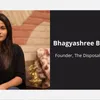What led this 14-year-old to work for period awareness through Project Pragati in rural India
Shocked to learn about menstruation being a reason for girls to quit school, Ananya Malde started an awareness drive for the rural population of her home state of Gujarat about puberty and menstrual hygiene.
Fourteen-year-old Ananya Malde was well aware of the science behind menstruation. She had learned in her biology class that it is a natural bodily function for women to menstruate every month as they shed the uterus (endometrium) lining.
However, she discovered the social taboo surrounding menstruation when her house help's younger sister had to quit school from seventh grade due to periods.
"They had a big function announcing that she is now at a marriageable age due to the period. I was pretty shocked to hear that and was not aware of how big a problem it is till then because to me, it definitely did not seem like a reason to drop out of school," she tells HerStory.
Further research online showed that the period impeding opportunities for young girls is a larger societal problem. As many as 23 million girls quit school due to the lack of proper menstrual hygiene to learn comfortably in schools, according to a report published by Dasra.
This prompted Ananya to start Project Pragati which aims to debunk the superstitions and support young girls in rural areas by providing period products.
Changing period perception
A grade nine student at National Public School Indiranagar in Bengaluru, Ananya joined the 1M1B Future leader programme, a UN-accredited non-profit initiative co-founded by Manav Subodh to nurture one million young changemakers.
By November 2020, she kickstarted the project with a focus on her home state Gujarat as her fluency in the regional language would help her to connect better with the rural population.
Through NGO partners of 1M1B foundation, Ananya spoke to the sarpanch of three villages and about a hundred school-going girls to gauge their understanding of period.
She noted a huge lack of awareness and education about periods among young girls and their parents as well.
“The parents do not know what periods are and why they occur in women. The school teachers who know wouldn’t teach the subject in detail and just skim through the subject telling the class that girls get periods and that's it. They are ashamed to teach or explain to them,” she says.
Lack of access to menstrual care facilities like sanitary napkins or the means to dispose of them is also a challenge. Many use clothes as they either don’t have access to pads in the vicinity or simply can't afford them.

(Representative image)
One awareness drive at a time
After the field research, the teenager decided to conduct awareness drives and fill in the resources gap to address the problem. However, it took a lot of convincing for the school principals to allow her to conduct awareness sessions.
Once permitted, she designed a comprehensive menstrual health curriculum that includes everything from puberty, adolescence to period and hormonal changes in the female body in Gujarati language as most resources available online are in English or Hindi. She then conducted awareness sessions, explaining the science behind menstruation for girls aged ten to 18.
“They were very open and comfortable talking to me about periods and asking questions that they couldn't ask their parents and teachers. Because I was their age, the sessions went better than expected,” she adds.
In April 2021, she started an online fundraiser and collected Rs 5.5 lakh which went towards providing sanitary napkins and getting incinerators installed in schools for pad disposal.
She went to Gujarat again in December and this time, travelled to remote areas of the Rann of Kutch where salt workers live in shacks for nine months from October to June. Separate shacks have also been set up by NGOs for the children as classrooms. But everyone has not heard of sanitary pads before.
Ananya says her awareness sessions have been especially impactful to them as she taught how to wear a pad, its disposal, and general menstrual hygiene.
So far, she has distributed over 30,000 sanitary pads and installed incinerators in two schools, one each in Kutch and Vadodara.
However, COVID-19 was a huge barrier as she could not travel to Gujarat from Bengaluru for more field work.
The young changemaker now has a list of English-medium, government schools in Bengaluru where she hopes to contribute positively through awareness sessions. Working in Bengaluru has earlier been a challenge as she does not speak Kannada.
She has also been selected to present her work at the 1M1B Summit at the United Nations headquarter in New York.
Edited by Affirunisa Kankudti








